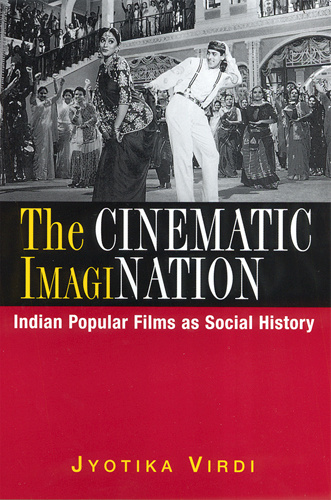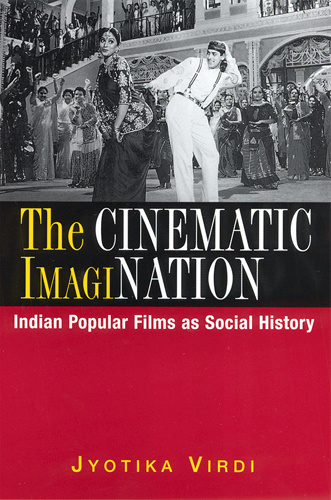The Cinematic ImagiNation
Indian Popular Films as Social History
Rutgers University Press
"This book makes an important contribution to the field of Asian film criticism, Indian film history, cultural studies, and gender studies. The Cinematic ImagiNation provides readers with valuable insight into the relationships between nation-building, gender, sexuality, the family, and popular cinema, using post-Independence India as a case study."
--Gina Marchetti, author of Romance and the "Yellow Peril": Race, Sex, and Discursive Strategies in Hollywood Fiction
India produces more films than any other country in the world, and these works are avidly consumed by non-Western cultures in Africa, Eastern Europe, the Middle East, and by the Indian communities in Australia, Britain, the Caribbean Islands, and North America. Jyotika Virdi focuses on how this dominant medium configures the "nation" in post-Independence Hindi cinema. She scrutinizes approximately thirty films that have appeared since 1950 and demonstrates how concepts of the nation form the center of this cinema's moral universe. As a kind of storytelling, Indian cinema provides a fascinating account of social history and cultural politics, with the family deployed as a symbol of the nation. Virdi demonstrates how the portrayal of the nation as a mythical community in Hindi films collapses under the weight of its own contradictions--irreconcilable differences that encompass gender, sexuality, family, class, and religious communities. Through these film narratives, the author traces transactions among the various constituencies that struggle, accommodate, coexist uneasily, or reconstitute each other over time, and, in the process, reveal the topography of postcolonial culture.
--Gina Marchetti, author of Romance and the "Yellow Peril": Race, Sex, and Discursive Strategies in Hollywood Fiction
India produces more films than any other country in the world, and these works are avidly consumed by non-Western cultures in Africa, Eastern Europe, the Middle East, and by the Indian communities in Australia, Britain, the Caribbean Islands, and North America. Jyotika Virdi focuses on how this dominant medium configures the "nation" in post-Independence Hindi cinema. She scrutinizes approximately thirty films that have appeared since 1950 and demonstrates how concepts of the nation form the center of this cinema's moral universe. As a kind of storytelling, Indian cinema provides a fascinating account of social history and cultural politics, with the family deployed as a symbol of the nation. Virdi demonstrates how the portrayal of the nation as a mythical community in Hindi films collapses under the weight of its own contradictions--irreconcilable differences that encompass gender, sexuality, family, class, and religious communities. Through these film narratives, the author traces transactions among the various constituencies that struggle, accommodate, coexist uneasily, or reconstitute each other over time, and, in the process, reveal the topography of postcolonial culture.
This book makes an important contribution to the field of Asian film criticism, Indian film history, cultural studies, and gender studies. The Cinematic ImagiNation provides readers with valuable insight into the relationships between nation-building gender, sexuality, the family, and popular cinema, using post-Independence India as a case study.
JYOTIKA VIRDI teaches communication/film/media studies at the University of Windsor, Canada.
Nation and its discontents. The nation, in theory ; The creative ImagiNation ; Theorizing national cinema ; Nation and its embodiments ; Pleasure and terror of the feminine
The idealized woman. Fixing the figure of the woman ; Woman, community, nation ; The "social butterfly."
Heroes and villains: narrating the nation. Masculinity ; Heroes and villains ; Sons and mothers
Heroines, romance, and social history. Reading resistance ; Contesting the Laxman Rekha ; Film/star text: reading social change
The sexed body. Filmic love ; Victims to vigilantes ; Rape and the rape threat ; The sexed body and specular pleasure ; Double-speak about the body ; Unsettled scores
Re-reading romance. Transgressions of "true love" ; Reinstating "family values" ; Romantic love and the culture of consumption ; The end of the Nehruvian Era
The idealized woman. Fixing the figure of the woman ; Woman, community, nation ; The "social butterfly."
Heroes and villains: narrating the nation. Masculinity ; Heroes and villains ; Sons and mothers
Heroines, romance, and social history. Reading resistance ; Contesting the Laxman Rekha ; Film/star text: reading social change
The sexed body. Filmic love ; Victims to vigilantes ; Rape and the rape threat ; The sexed body and specular pleasure ; Double-speak about the body ; Unsettled scores
Re-reading romance. Transgressions of "true love" ; Reinstating "family values" ; Romantic love and the culture of consumption ; The end of the Nehruvian Era





